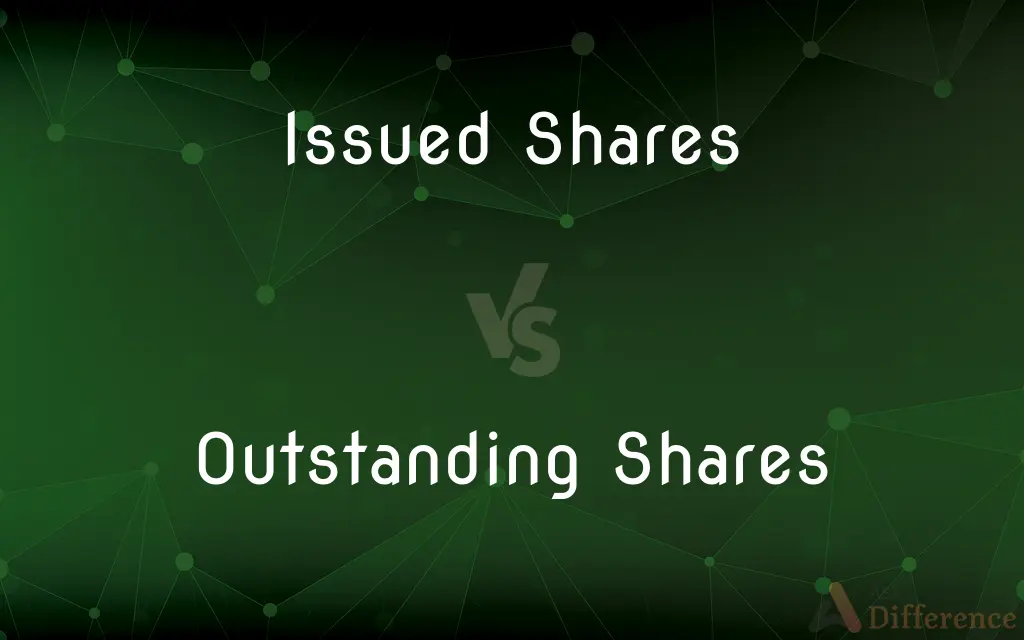Issued Shares vs. Outstanding Shares — What's the Difference?
Edited by Tayyaba Rehman — By Fiza Rafique — Published on November 6, 2023
Issued Shares means total created and distributed by a company. Outstanding Shares means issued shares minus any treasury shares.

Difference Between Issued Shares and Outstanding Shares
Table of Contents
ADVERTISEMENT
Key Differences
Issued Shares refer to the total number of shares that a company has legally created and distributed to shareholders, including both public investors and company insiders. Outstanding Shares, however, represent all shares currently held by shareholders, excluding any treasury shares that the company might have repurchased.
When a company decides to raise capital, it does so by issuing shares, which are then referred to as Issued Shares. These shares can be in the hands of the general public or the company's internal stakeholders. Outstanding Shares are a subset of these, representing the shares that remain in external hands and are not repurchased by the company.
Issued Shares are crucial because they denote the maximum potential number of shares a company can distribute without authorizing more. On the other side, Outstanding Shares are used in many calculations that determine the company's financial health, such as earnings per share (EPS) and market capitalization, both of which give investors a clearer picture of a company's value and performance.
Issued Shares once distributed, can be held by investors or repurchased by the company itself. If the company repurchases its shares, these become treasury shares and are no longer considered Outstanding Shares. Outstanding Shares thus fluctuate with corporate strategies like buybacks or additional issuances.
While Issued Shares reflect the total capital raised from equity, Outstanding Shares reflect the quantity of shares that contribute to the company's stock price in the market. Thus, while both are directly related, they offer different insights into a company's equity.
ADVERTISEMENT
Comparison Chart
Spelling
U, E, and D present
S, T, and G present
Syllables
Three
Four
Letters
12
18
Consonant to Vowel Ratio
7:5
13:5
Word Origin
Middle English/French origin
Middle English/French origin
Compare with Definitions
Issued Shares
Legally authorized shares by a company.
Per their financial reports, their Issued Shares amount to 200,000.
Outstanding Shares
Shares affecting market capitalization.
The company's market cap was calculated using its Outstanding Shares.
Issued Shares
Total stock a company has distributed.
The corporation has 100,000 Issued Shares, as noted in its charter.
Outstanding Shares
Excludes treasury stock.
Their Outstanding Shares decreased following the company's decision to buy back stock.
Issued Shares
Equity given to shareholders.
Issued Shares represent the portion of the company owned by public and private investors.
Outstanding Shares
Reflective of a company's true equity distribution.
The Outstanding Shares offer a clear picture of actual shareholder ownership.
Issued Shares
Shares a company has sold to raise capital.
The company's Issued Shares helped it secure the funds needed for expansion.
Outstanding Shares
Stock held by investors, not the company.
After the buyback, 95,000 Outstanding Shares remain.
Issued Shares
Shares available for trading.
The Issued Shares were quickly snapped up during the IPO.
Outstanding Shares
Used in financial metric calculations.
EPS was determined based on the number of Outstanding Shares.
Common Curiosities
Can the number of Issued Shares change?
Yes, a company can issue more shares with proper authorization, increasing the number of Issued Shares.
What defines Issued Shares?
Issued Shares are all the shares a company has legally created and provided to shareholders.
Why might the number of Outstanding Shares decrease?
If a company buys back its shares, the number of Outstanding Shares decreases.
How do Outstanding Shares differ from Issued Shares?
Outstanding Shares are the total shares held by investors, not repurchased by the company, whereas Issued Shares include all distributed shares.
Can Outstanding Shares increase without issuing new shares?
Yes, if a company releases treasury stock into the market, Outstanding Shares increase.
Can Issued Shares become Outstanding Shares again?
Yes, if a company sells its treasury shares, they become Outstanding Shares.
Do Outstanding Shares affect company valuation?
Yes, Outstanding Shares are used to calculate market capitalization, a key valuation metric.
Are all Issued Shares also Outstanding Shares?
No, Issued Shares include all shares distributed, while Outstanding Shares exclude treasury shares.
What happens to Issued Shares that aren't Outstanding?
Issued Shares not considered Outstanding are usually treasury shares held by the company.
What is the significance of Issued Shares in corporate governance?
Issued Shares determine shareholder voting power and dividend distribution.
How are earnings per share (EPS) calculated?
EPS is calculated by dividing the company's net income by the number of Outstanding Shares.
Are Outstanding Shares publicly traded?
Yes, Outstanding Shares represent the shares available for trading on the open market.
Do both Issued Shares and Outstanding Shares receive dividends?
No, only Outstanding Shares are eligible for dividends.
Who regulates the number of Issued Shares a company can have?
The number of Issued Shares is specified in the company's articles of incorporation and any increase must be approved by shareholders.
How often do the numbers of Issued Shares and Outstanding Shares change?
The count can change any time there's a new issuance, buyback, or sale of treasury shares.
Share Your Discovery

Previous Comparison
England vs. New England
Next Comparison
Step Sibling vs. Half SiblingAuthor Spotlight
Written by
Fiza RafiqueFiza Rafique is a skilled content writer at AskDifference.com, where she meticulously refines and enhances written pieces. Drawing from her vast editorial expertise, Fiza ensures clarity, accuracy, and precision in every article. Passionate about language, she continually seeks to elevate the quality of content for readers worldwide.
Edited by
Tayyaba RehmanTayyaba Rehman is a distinguished writer, currently serving as a primary contributor to askdifference.com. As a researcher in semantics and etymology, Tayyaba's passion for the complexity of languages and their distinctions has found a perfect home on the platform. Tayyaba delves into the intricacies of language, distinguishing between commonly confused words and phrases, thereby providing clarity for readers worldwide.
















































